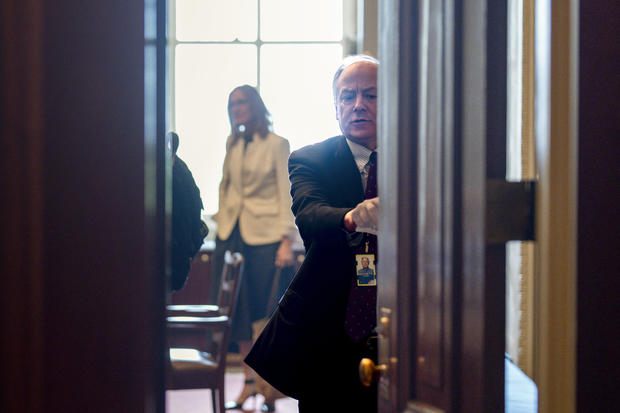Washington — Negotiations between representatives for the White House and House Speaker Kevin McCarthy over raising the debt ceiling resumed briefly Friday evening after stalling earlier in the day, but the two sides left the Capitol without a deal.
Following the short meeting Friday night, which lasted less than an hour and ended a little after 7:30 p.m., local time — this after the two sides had alleged earlier Friday that talks had completely stalled — the groups departed without an agreement, but were expected to keep the lines of communication open, CBS News learned.
Republican Rep. Garret Graves of Louisiana told reporters as he was leaving Friday night’s meeting that the two sides had a “candid discussion,” while GOP Rep. Patrick McHenry of North Carolina responded “no” when asked if he thought a deal would be reached over the weekend.
White House negotiator Steve Ricchetti told reporters, however, that “we’re going to keep working tonight.”
Prior to the meeting, McCarthy told Fox Business that “we’ll be back in the room tonight,” adding that the situation was “very frustrating if they want to come into the room and think we’re going to spend more money next year than … we did this year.”
“That’s not right,” he said. “And that’s not going to happen.”
J. Scott Applewhite / AP
When talks broke down earlier Friday, Graves — McCarthy’s lead negotiator — accused the White House of being “unreasonable.”
Leaving that earlier meeting, Graves said “we’re not there.” Graves said the decision was made to take a pause “because it’s just not productive” and “they’re just unreasonable.”
“The House passed a strong bill that had great savings in it, and it’s responsible, and it puts us on a path to bend the curve. And until people are willing to have reasonable conversations about how you can actually move forward and do the right thing, then we’re not going to sit here and talk to ourselves. So that’s what’s going on,” he said. Graves said he didn’t know when the group might reconvene.
Exactly what is holding up negotiators wasn’t immediately clear, but the two sides have competing demands and priorities on spending that have left them far apart.
A GOP aide believes one of the sticking points could be spending caps, while a Democratic aide was encouraged that the White House appeared to be holding its ground and isn’t “giving away the farm.” The Democratic aide also reiterated that any deal has to be bipartisan in nature.
Further complicating matters is the fact that President Biden is in Japan for a meeting of G7 leaders.
At the Capitol on Friday afternoon, McCarthy said Republicans need “movement by the White House.”
“We don’t have any movement yet, so yeah, we’ve got to pause,” the speaker said.
The White House acknowledged that there are “real differences between the parties on budget issues” and said “talks will be difficult,” while adding that “[t]he president’s team is working hard towards a reasonable bipartisan solution that can pass the House and the Senate.”
The apparent setback came one day after McCarthy and Senate Democratic Leader Chuck Schumer both struck optimistic tones about how talks were proceeding. The speaker said he could “see the path that we can come to an agreement,” and Schumer said negotiators were “making progress.”
Asked about those comments Friday, McCarthy said he “really felt we were at the location where I could see the path” but “we can’t be spending more money next year, we have to spend less than we spent the year before. It’s pretty easy.”
Treasury Secretary Janet Yellen has said the U.S. could be unable to pay its bills and might default on its debt as soon as June 1.
“[W]e still estimate that Treasury will likely no longer be able to satisfy all of the government’s obligations if Congress has not acted to raise or suspend the debt limit by early June, and potentially as early as June 1,” Yellen wrote earlier this week.
Republicans are aiming to slash spending and add work requirements for entitlements, among other things, while Democrats had initially hoped for a “clean” debt limit increase.
— Ed O’Keefe, Zachary Hudak and Nancy Cordes contributed reporting.

